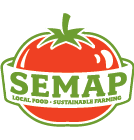Herald News
Event: SE MA Council on Sustainability Seminar 3/7/13
FALL RIVER — Gregory Watson had just been appointed the state’s commissioner of the Department of Agricultural Resources when he attended a conference of his peers from around the country.
He was seated next to the head of agriculture for South Carolina, who smiled when he heard Watson had to watch over farms in Massachusetts — flinty, rocky, hilly Massachusetts.
“He said to me that, if this country had been settled from west to east, all of Massachusetts would be a national park,” Watson said. “He asked me how we did any farming here.
“I told him it was Yankee ingenuity,” Watson said.
At the time, he was not sure what he meant by that. On Thursday, he saw it clearly, Watson said.
Watson was the keynote speaker at the Municipal Local Food Seminar held Thursday at the Advanced Technology and Manufacturing Center on Martine Street.
The conference was attended by farmers, store owners, school administrators, politicians and representatives of school and community groups. It was sponsored by the University of Massachusetts and SEMAP, the Southeastern Massachusetts Agricultural Partnership.
Massachusetts, Watson said, is doing all it can to help the state’s agricultural economy better accommodate small farms and food producers.
It is a change from the consolidation of farming that began 100 years ago and continues to this day, with corporate farms using chemical fertilizers and genetically modified foods to make crops and livestock grow more quickly, Watson said.
“We are substituting chemicals and imported energy for competence and know how,” Watson said. “We compromised.”
The state is ready to work with small farmers and food producers, offering help with projects and advice on finances, he said.
State agencies are also pushing the gospel of eating locally and in season and touting the benefits to consumers of buying fresh, local food, Watson said.
None of it is new, Watson said. He found Department of Agriculture documents from 1912 espousing the same ideals for Cape Cod farmers.
“We just have to reinvent ourselves a little bit,” he said.
State Rep. Paul Schmid, who runs a beef cattle farm in Westport, was one of the farmers there. When his father purchased the farm, 50 years ago, he followed the practices that had been in place for a century, keeping his herd of Angus cattle small enough to grass feed on his pasture land and get by through the winter on his hay.
There are challenges in being small, Schmid admitted. There are only two slaughterhouses that are federally certified in all of Massachusetts, so it would be difficult to enlarge his farm, even if he wanted to, Schmid said.
As it is, he can’t keep up with demand for the beef he raises, Schmid said.
“It is remarkable how tastes have matured, or reverted,” Schmid said. “People are going back to grass-fed beef and locally grown produce.”
The push will continue, organizers promised. SEMAP will hold its farm to table dinner on June 28 in Russell Mills, Dartmouth. April 2 is Agriculture Day at the Statehouse in Boston, Schmid said. Watson distributed his business card and called or farmer and organization members to lobby their local legislators for bills that will promote local agriculture.
“We are trying to find the simplest route between the earth, the hand and the mouth,” he said.
